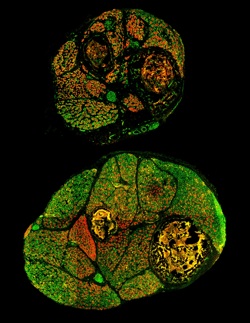Studies in developmental biology have been at the leading edge of modern biological research. Developmental biologists have made strides towards understanding pattern formation (Nobel Prize 1995), cell death (Nobel Prize 2002), aging, stem cell biology (Nobel Prize 2007), cell and tissue polarity. They have dissected major signaling pathways and uncovered principles of differential gene regulation, which together created a foundation for understanding human health and disease (cancer, birth defects, obesity). Studies in developmental biology led to the discovery of microRNAs and RNA interference (Nobel Prize 2006), and they have provided fertile ground for the newer disciplines of genomics and systems biology.
At the University of Utah, we have leading researchers working in diverse areas of developmental biology and using a wide array of model organisms (bacteria, yeast, C. elegans, Drosophila, mammals, Xenopus, chick, zebrafish and Arabidopsis). These scientists are brought together by the Developmental Biology Interest Group (DBIG). Students interested in pursuing graduate studies in developmental biology should apply to the Molecular Biology Program of the University of Utah.
Each faculty member of the Developmental Biology training program is affiliated with a University of Utah department or program: Biology – Life Science, South Biology, and Aline W. Skaggs Buildings; Biochemistry – Medical Center; Oncological Sciences – Medical Center and Huntsman Cancer Institute; Pathology – Medical Center; Neurobiology – Biomedical Polymers Research Building; Human Genetics – Eccles Institute of Human Genetics.
These departments occupy space in several buildings on campus. Use this map, to see where the departments are located.
Some students and postdocs within the DBIG are supported by the Developmental Biology Training Grant (DBTG). The DBIG and DBTG are organized by Joseph Yost and Kristen Kwan.


